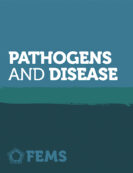FEMS Journals iPoster Prize: George Michail
We send our congratulations to George Michail and his co-writers Angeliki Reizopoulou and Ioannis Vagelas, who won one of the iPoster Prizes at the World Microbe Forum, sponsored by the FEMS Journals.

The World Microbe Forum took place between 20th and 24th of June 2021 as a virtual conference in collaboration with the American Society of Microbiology and several other partner societies. His winning poster was titled “S. proteamaculans and S. liquefaciens spp. isolated from subterrestrial karst aquatic ecosystem demonstrate substantial antifungal activity“.
Read our interview with George about his research below:
What is your current position and what was your scientific journey to get there?
I am currently an Assistant Professor in the School of Agricultural Sciences, Department of Ichthyology and Aquatic Environment (Volos), Greece. Previously, I did my PhD at the Faculty of Medicine Clinics, School of Health Sciences, University of Thessaly, Greece. The topic was on treatment response with last choice antibiotics in experimental infections of laboratory animals caused by multiresistant bacteria isolates. My bachelor’s degree was at the Veterinary Medicine from School of Veterinary Medicine, Aristotle University, Thessaloniki, Greece, and gave a broad spectrum of knowledge and scientific opportunities!”
Could you describe the research your poster covered?
The work that I presented at the World Microbe Forum was an investigation of cave bacteria abundance that guided us to Serratia spp. Our aim was to identify those species, research the production of metabolites and investigate potential antifungal activities. According to our results, we provide evidence of the first-time isolation of S. proteamaculans in bat guano. Our data showed novel information about the unique Serratia species found in a subterrestrial Karst aquatic ecosystem and the different bacterial strains in bat microbiome between Europe’s and America’s continent indigenous bats. We hope that our results can help future chemical compounds based on their metabolites and used as potential drugs!”
What do you hope to focus your research on in the future?
In the future, I hope to continue the research in aquatic ecosystems and investigate potential spillage of bacteria between environments and species. That would be under the umbrella of the One Health approach that recognizes that the health of people is closely connected to the health of animals and our shared environment!”
–
We use income from the FEMS Journals to fund grants, awards, and projects, and to support our knowledge sharing events and initiatives. Consider publishing your research with our journals to help the global microbiology community.
All but one of the FEMS journals are fully open access (OA), with one journal, FEMS Microbiology Letters, offering free-to-publish and OA options. Open access is key to supporting the FEMS mission of disseminating high quality research as widely as possible: when high quality, peer reviewed sound science is open access, anyone, anywhere in the world with an internet connection, can read it.







